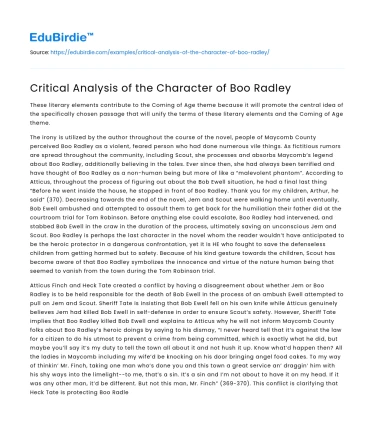These literary elements contribute to the Coming of Age theme because it will promote the central idea of the specifically chosen passage that will unify the terms of these literary elements and the Coming of Age theme.
The irony is utilized by the author throughout the course of the novel, people of Maycomb County perceived Boo Radley as a violent, feared person who had done numerous vile things. As fictitious rumors are spread throughout the community, including Scout, she processes and absorbs Maycomb’s legend about Boo Radley, additionally believing in the tales. Ever since then, she had always been terrified and have thought of Boo Radley as a non-human being but more of like a “malevolent phantom”. According to Atticus, throughout the process of figuring out about the Bob Ewell situation, he had a final last thing “Before he went inside the house, he stopped in front of Boo Radley. Thank you for my children, Arthur, he said” (370). Decreasing towards the end of the novel, Jem and Scout were walking home until eventually, Bob Ewell ambushed and attempted to assault them to get back for the humiliation their father did at the courtroom trial for Tom Robinson. Before anything else could escalate, Boo Radley had intervened, and stabbed Bob Ewell in the craw in the duration of the process, ultimately saving an unconscious Jem and Scout. Boo Radley is perhaps the last character in the novel whom the reader wouldn’t have anticipated to be the heroic protector in a dangerous confrontation, yet it is HE who fought to save the defenseless children from getting harmed but to safety. Because of his kind gesture towards the children, Scout has become aware of that Boo Radley symbolizes the innocence and virtue of the nature human being that seemed to vanish from the town during the Tom Robinson trial.
Save your time!
We can take care of your essay
- Proper editing and formatting
- Free revision, title page, and bibliography
- Flexible prices and money-back guarantee
Atticus Finch and Heck Tate created a conflict by having a disagreement about whether Jem or Boo Radley is to be held responsible for the death of Bob Ewell in the process of an ambush Ewell attempted to pull on Jem and Scout. Sheriff Tate is insisting that Bob Ewell fell on his own knife while Atticus genuinely believes Jem had killed Bob Ewell in self-defense in order to ensure Scout’s safety. However, Sheriff Tate implies that Boo Radley killed Bob Ewell and explains to Atticus why he will not inform Maycomb County folks about Boo Radley’s heroic doings by saying to his dismay, “I never heard tell that it’s against the law for a citizen to do his utmost to prevent a crime from being committed, which is exactly what he did, but maybe you’ll say it’s my duty to tell the town all about it and not hush it up. Know what’d happen then? All the ladies in Maycomb including my wife’d be knocking on his door bringing angel food cakes. To my way of thinkin’ Mr. Finch, taking one man who’s done you and this town a great service an’ draggin’ him with his shy ways into the limelight--to me, that’s a sin. It’s a sin and I’m not about to have it on my head. If it was any other man, it’d be different. But not this man, Mr. Finch” (369-370). This conflict is clarifying that Heck Tate is protecting Boo Radley from the limelight of Maycomb County because to him, it’d be a sin. Tate decided not to expose Boo Radley because he had saved the children’s lives and doesn’t necessarily want attention from it. Tate respects Boo’s reclusive life and prefers to be left alone. Heck knows that if they open up a full investigation into the events that occurred Boo Radley, would be brought into the public’s eye. The ladies of Maycomb would be knocking on his door, bringing treats to praise his actions and Boo, would have to be put through misery for his heroic act of helping the children by fending off Bob Ewell and bringing Jem and Scout to safety. Heck’s belief is that they should let the dead, bury the dead. It would not have been a kind thing to Boo Radley, to name him as a public heroic hero. Coming to the conclusion, Atticus goes along and agrees that Bob Ewell fell on his knife by accident. Additionally leaving Boo Radley’s involvement out of it.
Scout listens to Sheriff Tate’s explanation and fully understands the situation; if Sheriff Heck Tate charged Boo Radley with murder, ‘it would be sort of like shootin’ a mockingbird’. Referring back to when Miss. Maudie says that in a way, the mockingbird symbolically represents innocence. She metaphorically compares Boo Radley to an innocent, defenseless mockingbird. “Well, it’d be sort of like shootin’ a mockingbird, wouldn’t it?” (370). The moral of the story, after all this time, Boo Radley is one of the innocent characters, represented by a mockingbird. Tate considers that forcing Arthur to become the town hero would be a sin because Arthur’s nature is his shyness and reclusive to society. He doesn’t want to strip Boo Radley away from his comfort zone and force him to be part of society. Scout realizes that doing this act would be like shooting a mockingbird. Throughout the novel, mockingbirds symbolically represent innocent, defenseless individuals, who bring nothing but joy to the world. Boo Radley is a symbolic mockingbird because he is a compassionate neighbor who protects and looks out for Jem and Scout. Sheriff Tate’s explanation also illustrates how Boo Radley is a defenseless person who needs protection from the community’s limelight. At this point in the novel, Scout is mature enough to understand the delicate situation and metaphorically compares Boo Radley to an innocent, defenseless mockingbird.






 Stuck on your essay?
Stuck on your essay?

